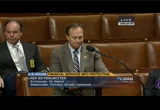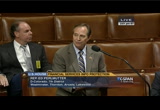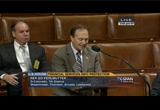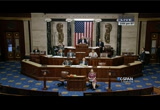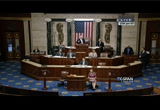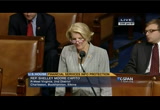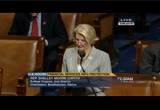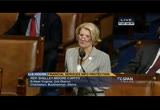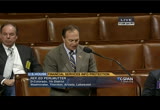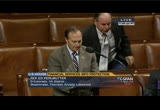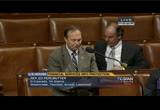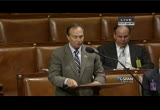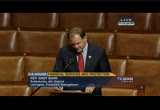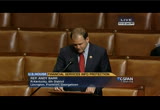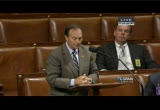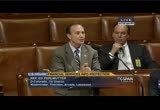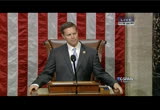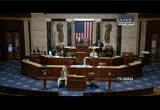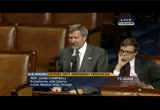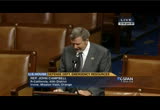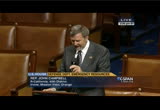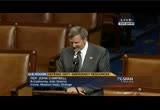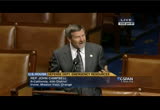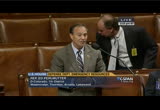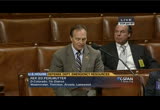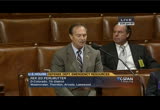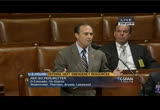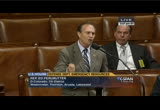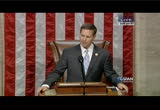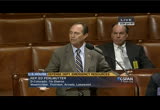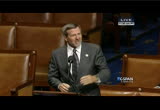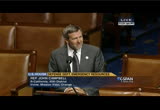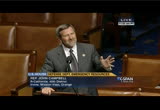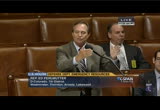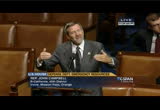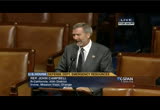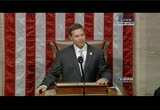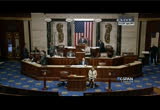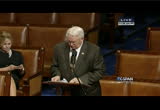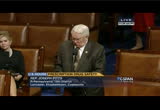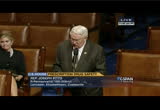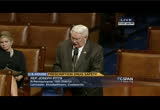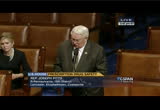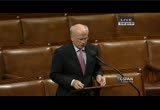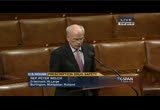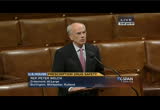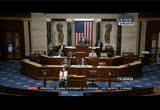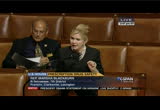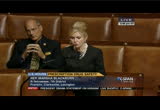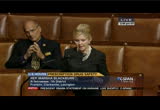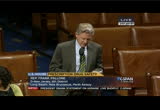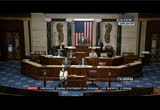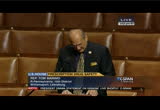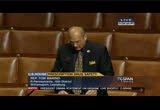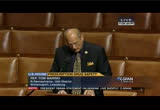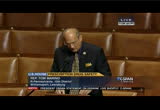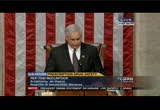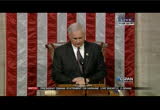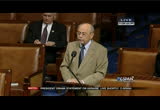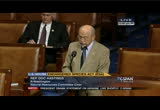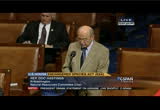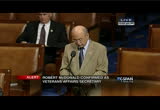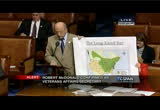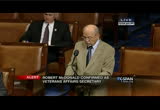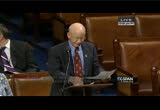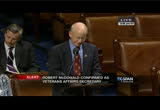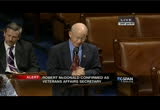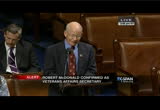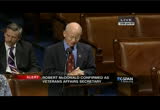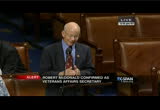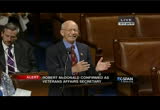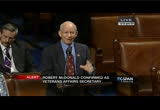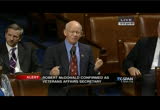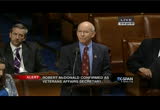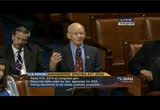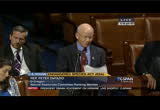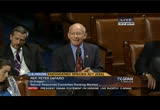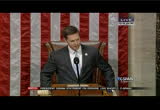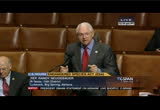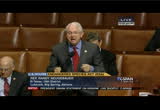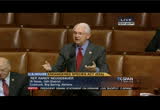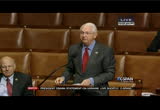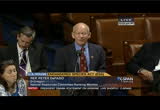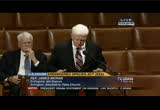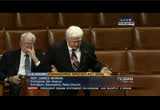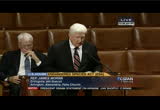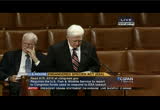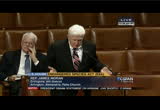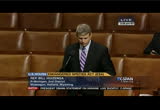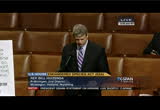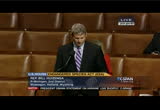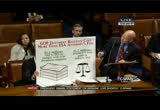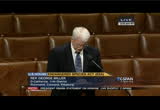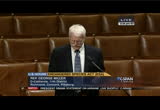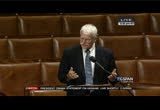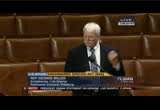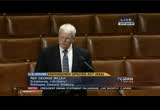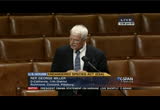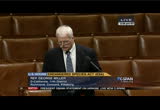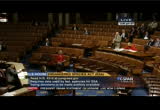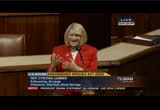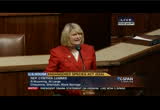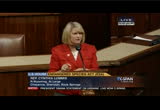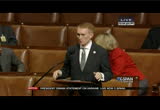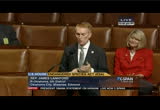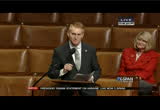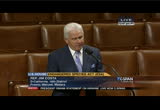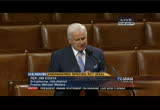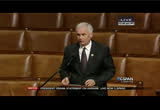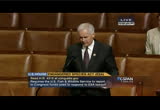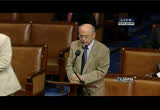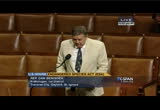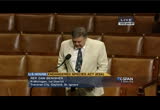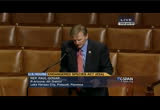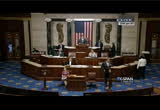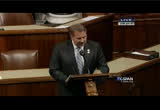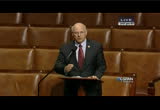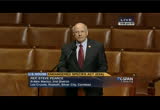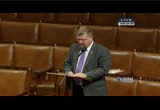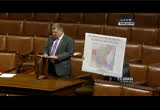tv Key Capitol Hill Hearings CSPAN July 29, 2014 2:00pm-4:01pm EDT
2:00 pm
i yield myself such time as i might consume. the speaker pro tempore: the gentleman is recognized. mr. perlmutter: h.r. 4626, introduced by chairwoman capito, aims at protecting shared information in the mortgage and financial services industry by putting safeguards on confidentiality. the bill is very simple, it applies the same confidentiality standards to information shared with state regulators regarding nondepository financial services companies that enjoyed -- being entered into in the national mortgage licensing system. as long as that information is shared through nationwide mortgage licensing system among all mortgage regulators. . in the leadup to the financial crisis, state regulators and congress needed the need to zwrofere see the mortgage industry and efficiently by promoting start regulation to state licensed, nonbank financial service providers.
2:01 pm
h.r. 4626 helps develop the nationwide mortgage licensing system, nmls, so that regulators retain the ability to keep track of bad actors and provide responsible mortgage providers with greater efficiency and consistency in the licensing process. h.r. 4626 does not create any additional privilege or confidentiality rights, but the safe fact currently provides that information shared through the nationwide mortgage licensing system among mortgage industry regulators retains existing state and federal privilege and confidentiality protections. the bill makes it so that these privileges and confidentiality protections remain as long as the information is shared with another mortgage regulator. the bill addresses uncertainty of confidentiality by clarifying that confidential or privileged information shared through the nmls would continue to be
2:02 pm
protected under state and federal law. this bill will increase the cooperation, and i think this is the key piece, this bill will increase the cooperation between federal and state regulators while ensuring that the nmls fulfills its mission to enshans consumer protection and stability -- enhance consumer protection and stability in the mortgage lending industry. i reserve the balance of my time. the speaker pro tempore: the gentleman reserves the balance of his time. the gentlelady from west virginia. mrs. capito: i'm prepared to close. i have no other speakers. mr. perfect mutter: -- mr. perlmutter: we have no other speakers. the speaker pro tempore: the gentleman from colorado is recognized. mr. perlmutter: this is a good bill. it should be passed by the house of representatives. it provides for safety for the whole mortgage lending system and the license sure system. it provides for cooperation between federal regulators and state regulators while preserving confidentiality rights.
2:03 pm
folks who are part of the licensing system. so i think a number of different goals are achieved. i thank the gentlelady from west virginia for introducing this bill. with that i urge its passage. i yield back the balance of my time. the speaker pro tempore: the gentleman yields back the balance of his time. the gentlelady from west virginia is recognized. mrs. capito: thank you, mr. speaker. i'd like to thank my friend from colorado for his support of this and for his service on the committee. he's a great member of the financial services committee. i would just like to reiterate ensuring confidentiality will bring about more effectiveness of the national registers. we are responding basically to what a lot of our state regulators had asked us to do to make sure that they better protect consumers and are able to keep the information in a privileged and confidential manner. with that i urge passage of the bill and i yield back the balance of my time. the speaker pro tempore: the gentlelady yields back the balance of her time. the question is, will the house uspend the rules and pass h.r.
2:04 pm
4626. so many as are in favor say aye. those opposed, no. in the opinion of the chair, 2/3 of those voting having responded in the affirmative, the rules are suspended, the bill is passed, and without objection the motion to reconsider is -- is laid upon the table. the speaker pro tempore: for what purpose does the gentlewoman from west virginia seek recognition? mrs. capito: i move the house suspend the rules and pass h.r. 5062, as amended. the speaker pro tempore: the clerk will report the title of the bill. the clerk: h.r. 5062, a bill to amend the consumer financial protection act of 2010 to specify that privilege is maintained when information is shared by certain nondepository covered persons with federal and state financial regulators, and
2:05 pm
for other purposes. the speaker pro tempore: pursuant to the rule, the gentlewoman from west virginia, mrs. capito, and the gentleman from colorado, mr. perlmutter, each will control 20 minutes. the chair recognizes the gentlewoman from west virginia. mrs. capito: thank you, mr. speaker. i ask unanimous consent that all members may have five legislative days to revise and and submit remarks any extraneous materials for the record on h.r. 5062, as amended, currently under consideration. the speaker pro tempore: without objection. mrs. capito: thank you. mr. speaker, i yield myself such time as i may consume. mr. speaker, this bill is very similar to the previous bill that we just passed. i rise in support of h.r. 5062, the examination and supervisory privilege parity act of 2014. we always want to have a nice long name for everything. congratulate my colleagues on the financial services committee, mr. perlmutter and mr. barr, for their hard work on advancing this legislation. this bill clarifies that the sharing of information between federal banking regulators and
2:06 pm
state agencies that license, supervise, or examine the offering of financial -- consumer financial products or services, will not be construed as waiving, destroying, or otherwise affecting any privilege or confidentiality right that a person could claim. americans are familiar with the concept of privilege. under current law legal privilege exes with respect to certain communications so long as they are not shared with a third party. attorney-client privilege for example is destroyed if a client shares what he communicated with his attorney with his colleague at work. this legislation provides assurance for financial institutions that privileged information shared between federal banking regulators and state regulatory agencies will be protected and remain confidential. this will encourage a greater amount of sharing between institutions and their regulators and will allow our nation's financial regulators to do their jobs to ensure that our financial institutions are operating lawfully while at the same time able to cover consumer
2:07 pm
credit products that are critical to americans to finance their everyday purchases and start small businesses. the examination and supervisory privilege parity act is a simple bipartisan bill that clarifies this is not always the case. i again congratulate mr. barr and mr. perlmutter on their work and i reserve the balance of my time. the speaker pro tempore: the gentlelady reserves the balance of her time. the gentleman from colorado is recognized. mr. perlmutter: thank you, mr. speaker. i yield myself such time as i may consume. the speaker pro tempore: without objection. mr. perlmutter: thank you. i rise in support of h.r. 5062, the examination and supervisory privilege parity act. which is difficult to say but easy to understand. it's to provide for full cooperation and discourse and communication among regulators while at the same time preserving some confidentiality and protections for those whose books and records are being reviewed. i want to thank my friend,
2:08 pm
congressman barr, for working with me on this legislation. this legislation accomplishes two important things. first, it reduces regulatory burden by ensuring federal regulators, the cfpb, state banking agencies, and now nonbank agencies, may coordinate their respective examination schedules. and, two, it provides parity to ensure privilege is not compromised when regulated entities turn over sensitive information to their regulators, and when this information is subsequently shared among state and federal agencies. dodd-frank, the legislation empowered the consumer financial protection bureau, to regulate and supervise and examine providers of consumer credit and financial products. among these companies, nonbank financial institutions are typically state licensed and their primary regulator is often the state banking commissioner. however in 15 states such entities are overseen by a
2:09 pm
nonbank agency such as the attorney general, the department f regulatory affairs, or a dedicated consumer credit commissioner. the bill extends the same protections that apply to all consumer creditors to ensure an effective and equitable examination and investigatory process. under the federal deposit insurance act, similar protections exist for banks which benefit from express legal protection that provides the confidence and legal certainty to turn over privileged information and documents at the request of the regulators. this protection encourages regulated entities to comply with the examinations and mitigates their anxiety about disclosing sensitive proprietary information to regulators. sharing of information will not waive attorney-client work product or other privileges recognized under federal or state law. let me be clear, a firm cannot overany information to their regulators -- over any information to their regulators
2:10 pm
and shield themselves from third party lawsuits. privilege of information only extends to the information requested by the regulators during the course of supervisory examinations per state and federal law. additionally, the bill codifies the cfpb guidance bulletin and regulation that says that, quote, the confidential treatment of information that would provide that any person submission of information to the bureau in the course of the bureau's supervisory or regulatory processes, will not waive any privilege such person may claim with respect to such information. close quote. they go on to state, the rule is intended to, quote, provide protections for the confidentiality of privileged information, substantively identical to the statutory provision that is apply to the submission of privilege information to the prudential regulators and state and foreign bank regulators. however, this bill will extend protections to nonbank state regulators such as the attorney
2:11 pm
general in colorado and those regulated entities. i'm a strong supporter and believer in the dodd street wall street reform an consumer protection act but i also know certain technical fixes need to be made. that is why i urge passage of this bill introduced by my friend, mr. barr. with that i reserve the balance of my time. the speaker pro tempore: the gentleman reserves the balance of his time. the gentlelady from west virginia is recognized. mrs. capito: thank you, mr. speaker. i now yield such time as he may consume to the author of the bill, a great member of the financial services committee, mr. barr from kentucky. the speaker pro tempore: the gentleman from kentucky is recognized. mr. barr:i thank the gentlelady for yielding. i appreciate her leadership as the chairman of the financial institution subcommittee and for her support of this important legislation. i rise in support of h.r. 5062, the examination and supervisory privilege parity act. i want to thank the gentleman from colorado, my friend, mr. perlmutter, for working with me
2:12 pm
in a bipartisan fashion to introduce and advance this legislation. in central kentucky one of our signature industries is the auto manufacturing industry. no place exemplifies this proud fact more than toyota motor manufacturing of kentucky, and the plant that is located in my district in georgetown, kentucky. with over 7,300 toyota team members and their families dependent on these high quality jobs in that facility, i'm committed to doing everything i can to support these kentucky workers. this legislation does that. h.r. 5062 is, as my friend from colorado said, a technical fix. but it is an important piece of legislation because it helps automobile finance companies like toyota financial services, which finances over 2/3 of new vehicle sales for toyota customers. this legislation assures that these consumer lenders that when they provide confidential and
2:13 pm
privileged information to their regulators in the course of supervision, the customary privilege or confidentiality of that information is not waived when shared with state regulatory agencies. this is necessary because the unintended fragmented structure of current law leaves privileged and confidential status of this information in question. and that poses a significant risk to auto finance companies. consumer access to finance is vital for new car sales and a healthy car market. and a healthy car market is good for the 7,300 automobile manufacturing workers in central kentucky and all around america. i urge support for this legislation which, again, simply guarantees that when the consumer financial protection bureau asks for confidential and privileged information from a finance company and shares that information with a state regulator, that information shared will continue to be treated as privileged and
2:14 pm
confidential. i urge support for this legislation and i yield back. the speaker pro tempore: the gentleman's time has expired. pl mrs. capito: itch no further speakers. i'm prepared to close. i reserve the balance of my time. the speaker pro tempore: the gentlelady reserves the balance of her time. the gentleman from colorado is recognized. mr. perlmutter: thank you, mr. speaker. i first would like to introduce into the record speaking of toyota, a letter dated july 14 to myself and to mr. barr, a letter from the financial services round table dated july 29, 2014. a letter from honda dated july 15. a letter from the conference the state bank supervisors, dated july 15. a letter from the american financial services association dated july 25. d a letter from a variety of
2:15 pm
automobile finance companies dated july 25, it says 2013 but i believe it's 2014. the speaker pro tempore: without objection. all will be allowed. mr. perlmutter: since there are no other speakers on the majority side of the aisle, i will close as well. . this is very similar to the bill we heard as well. it's really trying to do two things. one, add the cooperation among federal and state regulators and potential companies, individuals who might be under examination by those regulators so that the individual or company who is providing information to the regulators knows that that information maintains protections and confidentiality and privilege in those respects. we're seeking additional cooperation and additional communication. this bill that congressman barr and i have introduced i think gets to those two key goals, and, again, the purpose is so
2:16 pm
that the regulators understand what it is that they're examining and have as much information as possible and that they give full cooperation from -- get full cooperation from those being examined. so i thank my friend for introducing this bill and with that i yield back the balance of my time. the speaker pro tempore: the gentleman yields back the balance of his time. the gentlelady from west virginia is recognized. mrs. capito: thank you, mr. speaker. i'd again like to thank the sponsors of the legislation, mr. barr, mr. perlmutter, for working together to seek a fix i think that will result in good things for the coordination aspect of the state regulators and federal regulators. with that i'd encourage passage of the bill, and i'd yield back the balance of my time. the speaker pro tempore: the gentlelady yields back the balance of her time. the question is will the house suspend the rules and pass the amended. 5062, as those in favor say aye. those opposed, no. in the opinion of the chair, 2/3 having responded in the affirmative, the rules are suspended, the bill is passed, and without objection the motion to reconsider is laid on
2:17 pm
the table. without objection, the title is amended. for what purpose does the gentleman from california seek recognition? >> mr. speaker, i move that the house suspend the rules and pass h.r. 4809, as amended. the speaker pro tempore: the clerk will report the title of the bill. the clerk: h.r. 4809, a bill to re-authorize the defense production act, to improve the defense production act committee, and for other purposes. the speaker pro tempore: pursuant to the rule, the gentleman from california, mr. campbell, and the gentleman
2:18 pm
from colorado, mr. perlmutter, each will control 20 minutes. the chair recognizes the gentleman from california. mr. campbell: mr. speaker, i ask unanimous consent that all members may have five legislative days to revise and submit heir remarks and extraneous materials for the record on h.r. 4809, as amended, currently under consideration. the speaker pro tempore: without objection. mr. campbell: mr. speaker, i yield myself such time as i may consume. the speaker pro tempore: the gentleman is recognized. mr. campbell: thank you, mr. speaker. this bill today, 4809, is a bill to re-authorize the defense production act. simply put, the defense production act is a bill that is intended to minimize distortions to the economy when it is necessary for the government to take actions to aid speedy recovery from large natural or man-made disasters or to protect our service men and women during combat situations. the underlying legislation was used in the recoveries from hurricanes katrina and sandy and used to get new body armor
2:19 pm
in a hurry for troops in iraq and afghanistan when supplies ran dangerously low. shortly after the outbreak of the korean war was when congress first enacted the defense production act which we call the d.p.a., granting the president broad powers to access prompt, adequate and uninterrupted supplies of industrial resources to satisfy national security needs. during that war, the d.p.a. was used to establish a robust national defense infrastructure which later provided the u.s. strength in ensuring -- in the ensuing cold war. since then, the d.p.a. has been used only sparingly in recent years, congress expanded the executive's use of the d.p.a. to include the protection of critical infrastructure and needs arising from civil emergencies such as hurricanes in addition to its defense purposes. when it was enacted, the d.p.a. consisted of seven titles, including some controversial wage and price controls. as the korean war wound down,
2:20 pm
four of those titles were allowed to expire. the remainder of the law, the remaining three titles, have operated effectively and without much controversy since. there are three remaining titles, first, title 1, which grants the president authority to meet urgent, defense or disaster recovery requirements. this authority essentially allows the government to move to the head of a company's production and delivery schedule and indemnifies that company against breach or contract lawsuits by nongovernment entities. title 3 authorizes the president to use loans, purchase commitments and grants to encourage contractors to establish or expand industrial capacity and produce items that are essential to the national defense that must be domestically produced but are otherwise not economically attractive enough to have a domestic producer. these programs are usually small, tiply less than $15
2:21 pm
million, and in the history of the d.p.a., back going back to the korean war, only three exceeded $50 million, each of which was specifically authorized by congress. title 7 authorizes the president to provide antitrust exemptions for voluntary agreements and joint activities among private entities intended to address production and distribution problems that might impair defense preparedness. while the first two titles and the rest of title 7 expire at the end of september, title 7 also contains the authorization of the committee on foreign investment in the united states, which scrutinizes foreign direct investments proposal -- process to ensure that they do not threaten national security. that authority does not sunset and it does not before and it does not in this re-authorization. mr. speaker, the bill before us re-authorizes the d.p.a. for five years and reinstates some modest reforms. the reforms that were in place prior add back the guidelines
2:22 pm
for the use of title 3 that clarify that it must -- title 3 must the most cost-effective solution to the defense industrial-based shortfall and it has a requirement for a separate congressional authorization for products -- projects greater than $50 million. as i just described, all previous projects greater than $50 million since the korean war have all achieved congressional re-authorization. so this really isn't changing what has been existing practice. the reforms also stipulate that the use of title 3 may only be approved by the president and makes some changes to improve the effectiveness of an interagency coordinating committee on the uses of the d.p.a. mr. speaker, this bill preserves the vital and important authorities of the d.p.a. while preventing any abuse or perception of misuse. it passed the financial services committee in june by voice vote, and i would urge immediate passage of this and
2:23 pm
its commonsense reforms and i reserve the balance of my time. the speaker pro tempore: the gentleman reserves the balance of his time. the gentleman from colorado is recognized. mr. perlmutter: thank you, mr. speaker. and i thank the gentleman from california for working on this bill, for getting it reintroduced and hopefully today getting it passed. i thank him, too, for working with a number of us on certain provisions. when the defense production act was initially enacted in 1950 -- and i yield myself so much time as i might consume, mr. speaker. the speaker pro tempore: the gentleman is recognized. mr. perlmutter: thank you. when the defense production act was initially enacted in 1950 in the aftermath of world war ii and in the midst of the korean war, it contained seven separate titles that granted broad authority to the president to control national economic policy. following the korean war, three of the defense production act titles remained in effect and two of the act's titles needs
2:24 pm
to be re-authorized. first is title 1 of the d.p.a. which is the defense production act which authorizes the priority treatment of contracts and orders to meet urgent defense or readiness requirements. it does so by allowing the government to move to the head of the company's line of production and delivery schedule while indemnifying the company against breach of contract lawsuits against nongovernment entities. title 3 is the other key provision of the law that congress needs to re-authorize. this title empowers the president to support the private sector through the use of financial incentives, including loans, guarantees, purchases and grants to ensure that the u.s. industrial domestic base has the production capabilities that the president has determined are essential to our national security. congress has re-authorized the d.p.a. on bipartisan -- on a bipartisan basis approximately 50 times since its first enactment in 1950.
2:25 pm
it has been used in all administrations since president truman during both peace and times of conflict to support the national security programs of the united states of america. the measure includes several reforms. first, the measure would restructure and refocus the defense production act committee and interagency advisory body on the priorities and allocation authorities contained in title 1. agency heads are also required to issue and review rules that would establish the standards and procedures by which title 1 authorities can be used. in closing on this subject, let's be very clear. the defense production act is a law of great national significance. it's been re-authorized many times. it provides powerful authorities for purpose of our national defense and security, and i urge the adoption of the defense production act as we have modified it. i would state, mr. speaker, we
2:26 pm
have other bills very similar to this that need to be acted on by the republican majority, starting with the export-import bank which itself has been re-authorized numerous times by both parties whoever was in the majority and yet the export-import bank is sitting there holding fire when it is a benefit, a strong benefit to this country and to the businesses of this country so that we can be on even footing with all of the other countries competing for business around the world. secondly, the tria, which is the terrorist risk emergency insurance act. it, too, is sitting there without action being taken by the republican majority of this congress. it, too, has been re-authorized on several occasions and it benefits this country in many ways and needs to be acted upon. but instead, the republican
2:27 pm
majority has chosen to bring a lawsuit against the president of the united states, which has absolutely no merit and has given their lawyers in the proposed legislation a blank check to sue the president when we have important legislation, whether it's the export-import bank, terrorist risk insurance, looking at immigration issues, comprehensive immigration reform, transportation. we have many, many items that need to be addressed, but instead we're going to take up litigation that's unheard of in the history of the united states against the president of the united states because he's taken actions when this congress has sat silent. this bill, the defense production act, i thank my friend from california for bringing it. it needs to be passed. i urge its passage. so many other things need to be passed and not just ignored in the face of doing something so political as suing the
2:28 pm
president of the united states. i reserve the balance of my time. the speaker pro tempore: the gentleman reserves the balance of his time. the gentleman from california is recognized. mr. campbell: mr. speaker, i'm prepared to close if the gentleman from colorado is. so i'm precleared to close. we have no further speakers. i'll reserve the balance of my time. the speaker pro tempore: the gentleman reserves the balance of his time. the gentleman from colorado is recognized. mr. perlmutter: we have no other speakers, so i will close and i will urge my friend from california, i will urge the speaker to dispose of what we're supposed to take up tomorrow or thursday in this lawsuit against the president of the united states for taking steps that we here in congress apparently are refusing -- and i say to the republican majority, you're refusing to bring up and to have heard and voted on transportation -- voted on. transportation should be a bipartisan matter. the export-import bank, which benefits our companies, our businesses and has been
2:29 pm
authorized since the 1930's, makes money for the country, that should be brought up. we should be bringing up the terrorist risk insurance so that companies across the country know that in the terrible event of another attack like we had on 9/11 that there is a backstop for them and their properties and their people. but, no, we're taking up litigation, not legislation. that's just wrong, mr. speaker. i can't object to it in any greater terms. it just makes no sense. it does not advance the ball for america, doesn't advance the ball for middle america. people are looking for jobs and want to see that their kids go to college, want to have retirement security. just a political statement when we could be doing a lot more. this congress can do so much more. passage of this defense production act is doing something, and i thank my
2:30 pm
friend for that. i urge its passage, and i -- you guys want to say anything? i yield back the balance of my time. the speaker pro tempore: the gentleman from colorado yields back the balance of his time. the gentleman from california is recognized. mr. campbell: thank you, mr. speaker. i yield myself the balance of my time. first of all, let me thank the gentleman from colorado and my friends on the other side of the aisle for their work on and support of this defense production act for which i will call the vote in just a moment. but as to comments that my friend from colorado made, first of all, i think he knows -- i agree with him on export-import bank and on terrorism risk insurance. so you're not going to have any debate from me there. clearly, later this week the action to sue the president will come on the floor. there will be plenty of time to debate that. just one comment i'd like to make -- and you mention bipartisanship and i agree with you, there's not enough around here, and there needs to be. nd in the end, you can never
2:31 pm
move the country forward sustainably without getting something that has support on both sides. so i agree on that. ut when i first got here 10 -- almost 10 years ago, george w. bush was president and a number of -- i saw a number of your colleagues -- the democrats had a button that said article 1. i'm like, what's that? . . this is to show we congress are art i cannle 1. the executive branch is artle 2. and we believe the president, george w. bush, is treading upon the rights enumerated in the constitution that rightly belong to the first branch of government, congress. now we, republicans believe, that the current president, barack obama, is doing the same thing. here's a place where i think maybe we can have some bipartisanship at some point.
2:32 pm
when george w. bush was president, you thought he went too far. many of us probably did, too, but didn't say so because of party loyalty. now we believe this president is going too far. i would wager to guess that some of your side believes that, too, but isn't saying so because of party loyalty. at some point -- mr. perlmutter: taking back my time. million campbell: in this i.n.s. tuesday, in this body need to protect its constitutional responsibilities against the executive -- how much time do i have, mr. speaker? the speaker pro tempore: the gentleman has 11 1/2 minutes. mr. campbell: i'm happy to yield to the gentleman from colorado. mr. perlmutter: i thank my friend. i do appreciate, you are absolutely right, i would say to the speaker, my friend from california is absolutely right that to have sustainable movement of this country forward it does take both sides of the aisle. republican side of the aisle,
2:33 pm
democratic side of the aisle. i would suggest to my friend that democrats did not have control of the house, did not bring legislation, or litigation, if you will, against president bush. and i would suggest to my friend, take a look at the numbers of executive orders that ronald reagan issued, that bill h.w.on issued, that george bush, george w. bush, and compared to president obama. but i would yield back. i appreciate your willingness to let me speak and get that in. i yield back. again i urge the passage of the defense production act. . campbell: i thank -- the speaker pro tempore: the gentleman from california is recognized. mr. campbell: i thank the gentleman from colorado. i understand point. some individual members, i believe, did introduce, the did didn't per say,
2:34 pm
introduce some charges f. you will, against president bush. the point i was simply trying to make is each side of the aisle has felt that the rights under the constitution of this institution have been trodden upon by a president of the other side of the aisle. what the right response to that is, and what the right remedy to that is, we can debate. but i am retiring at the end of this year, so i'm leaving all of this for you-all. but as we grow the executive branch, as we add more departments, we add more things, we continue to concentrate power there and take it away from here. and this place for all its faults and foibles, it has plenty of them, it is accountable to the people. it is accountable to the people in a way that the executive branch can't ever be. and that's why we on a bipartisan basis if it's not
2:35 pm
with this president, then with the next one, we need to start clawing some of those rights and responsibilities back to article 1 of the constitution. with that, mr. speaker, i thank again for the defense production act, cooperation involvement of my friends on the other side of the aisle, and i would ask for its passage. i yield back the balance of my time. the speaker pro tempore: the gentleman yields back the balance of his time. the question is, will the house suspend the rules and pass the ill h.r. 4089, as amended. this is 4809. apologize for the miscommunication. the question is will the house suspend the rules and pass the bill h.r. 4809, as amended. so many as are in favor say aye. those opposed, no. in the opinion of the chair, 2/3 of those voting having responded in the affirmative, the rules are suspended, the bill is passed, and -- the gentleman
2:36 pm
from kentucky is recognized. >> i request a recorded vote. the speaker pro tempore: the gentleman ask for the yeas and nays? >> correct. the speaker pro tempore: the yeas and nays are requested. all those in favor of taking this vote by the yeas and nays will rise and remain standing until counted. a sufficient number having arisen, the yeas and nays are ordered. pursuant to clause 8 of rule 20, further proceedings on this question will be postponed.
2:37 pm
the speaker pro tempore: for what purpose does the gentleman from pennsylvania seek recognition? mr. pitts: mr. speaker, i move the house suspend the rules and pass the bill h.r. 4709, as amended. the speaker pro tempore: the clerk will report the title of the bill. the clerk: h.r. 4709, a bill to improve enforcement efforts related to prescription drug diversion and abuse, and for other purposes. the speaker pro tempore: pursuant to the rule, the gentleman from pennsylvania, mr. pitts, and the gentleman from new jersey, mr. pallone, each will control 20 minutes. the chair recognizes the gentleman from pennsylvania. mr. pitts: mr. speaker, i ask unanimous consent that all members may have five legislative days to revise and insert heir remarks and extraneous materials into the
2:38 pm
record on the bill. i would like to include an exchange of letters between the committee on energy and commerce and the committee on the judiciary. the speaker pro tempore: without objection. mr. pitts: mr. speaker, i yield myself such time as i may consume. the speaker pro tempore: without objection, the gentleman is recognized. mr. pitts: mr. speaker, the bill before us today is important and necessary legislation to bring greater clarity to the requirements for the safe and secure distribution and dispensing of controlled substances to combat the abuse of prescription drugs. h.r. 4709, the ensuring patient introduce ffective bide my colleague, representative marino of pennsylvania, marsha blackburn of tennessee, judy tchue of california will facilitate greater collaboration between
2:39 pm
industry stakeholders and regulators in an effort to combat our nation's prescription drug abuse epidemic. safeguarding our prescription drug supply chain is important to protect against diversion and abuse of prescription medicines. h.r. 4709 will clarify terminology in the controlled substances act. to give registrants a better understanding of their responsibilities under the law. further the bill will allow d.e.a. registered companies to address potential violations in the absence of imminent danger. creating a moreau bust and meaningful die -- more robust and meaningful dialogue in addressing drug diversion. that in turn should curtail unnecessary supply chain disruptions that adversely affect patient access to much needed medications.
2:40 pm
additionally, the legislation requires that a report be submitted to congress by the secretary of h.h.s. in consultation with the d.e.a. and other government and industry stakeholders about how collaboration between enforcement agencies and industry can benefit patients and prevent diversion and abuse. equally important h.r. 4709 will improve enforcement efforts regarding the complex and challenging problem of prescription drug diversion and abuse. it will ensure patient access to necessary medications by creating a more collaborative partnership between drug manufacturers, wholesalers, retail pharmacies, and federal enforcement and oversight agencies such as d.e.a. and the f.d.a. after hearings last april, in the health subcommittee of the
2:41 pm
energy and commerce committee, which i chair, we heard that a more feasible and practical solution to this serious problem of drug diversion and abuse is attainable. and those provisions are included in h.r. 4709. the legislation is supported by the national community pharmacist association, the national association of chain drug stores, the health care distribution management association, as well as the alliance to prevent the abuse of medicines among others. and i would like to acknowledge and thank my good friend, congressman tom reno, for his excellent work with this--- this legislation. my friend from pennsylvania is a former district attorney and former u.s. attorney. he understands the importance of law enforcement in this area. but he also understands that we will be more effective if we
2:42 pm
proceed in a collaborative, communicative, and transparent fashion. and he has done excellent work here. mr. speaker, by approving this legislation, we will be giving our nation's law enforcement additional ills tools while protecting our patients and securing our drug supply chain in a reasonable and commonsense way. i urge all of my colleagues to support this bill and vote for h.r. 4709, and i reserve the balance of my time. the speaker pro tempore: the gentleman reserves the balance of his time. the chair will receive a message. the messenger: mr. speaker, a message from the president of the united states. the speaker pro tempore: mr. speaker. the speaker pro tempore: mr. secretary. the secretary: i'm directed by the president of the united states to deliver to the house of representatives a message in writing. the speaker pro tempore: the gentleman from new jersey is recognized. mr. pallone: thank you, mr. speaker. i'd like at this time to yield to the gentleman from vermont
2:43 pm
such time as he may consume. the speaker pro tempore: the gentleman is recognized. mr. welch: thank you, mr. speaker. i thank the gentleman and i endorse everything the chairman just spoke about. i'm proud that the house is taking up this bipartisan action today to address an issue in each of our districts. and i want to thank, especially, mr. marino, who is using his experience to bring this legislation to the floor. it was great working with him. mrs. blackburn, and also with congresswoman chu. vermont is facing an opium epidemic. that's true in many states around the country. in addition to the alarming increases in heroin abuse, we have had admissions in vermont for prescription drug abuse that have increased 361% from 2005 to 2013.
2:44 pm
and as we have seen in my state, we are most effective in dealing with this public health crisis when everybody who has a stake in this works together. that's the collaborative approach that mr. pitts mentioned. that's got to be the providers, public health officials, law enforcement, distributors, pharmacists. they have all got to come together to tackle this problem. if you don't have flexibility and collaboration, we can do something that might make enforcement tighter but access to legitimate prescription drugs tougher. so the goal here is to get the balance right. we want to help folks get access to the prescription medication that they need, alleviate suffering. eliminates pain. but we want to make sure that the enforcement is solid so there isn't the abuse. today distributors like burlington drug company in vermont and local pharmacist face very unpredictable enforcement from the d.e.a.
2:45 pm
the d.e.a. has a job, but so do the drug distributors and the doctors. that inconsistent enforcement that are unpredictable enforcement, i should say, can lead to disruptions in the supply chain which end up limiting patient access to legitimate prescription drugs. the ensuring patient access and effective drug enforcement act will encourage that collaboration between law enforcement, members of the supply chain, and public health providers and officials while ensuring that patients do have the access to the treatment their doctor has prescribed. . so this is, mr. pitts, as you said, common sense. each entity in this process has its own job to do but for all of us to do it together, we got to work together and communicate. it's been great to work with representatives marino, blackburn and chu on this bill.
2:46 pm
i thank them for their leadership, and i want to thank, too, chairman upton and ranking member waxman for his leadership and, of course, mr. pallone and mr. pitts. i yield back and urge my colleagues to support h.r. 4709. the speaker pro tempore: the gentleman yields back. does the gentleman from new jersey reserve his time? mr. pallone: yes, i reserve my time. the speaker pro tempore: the gentleman reserves the balance of his time. the gentleman from pennsylvania is recognized. mr. pitts: mr. speaker, i'm pleased to yield three minutes to the gentlelady from tennessee, vice chairman of the energy and commerce committee, another leader on this issue. the speaker pro tempore: the gentlelady from tennessee is recognized for three minutes. mrs. blackburn: thank you, mr. speaker. and i want to thank the chairman for his work on this issue, for working with congressman marino and congressman welch and congresswoman chu as we sought to move the issue forward. we also thank chairman upton for working with us as we brought the issue forward. the gentleman from vermont
2:47 pm
mentioned the epidemic and the widespread abuse that is taking place in prescription drugs and the need to do something about that. we all agree on this, and here are some stats that really back this up and show why it has become an epidemic. in 2013, more people died in the u.s. from prescription drug abuse than from heroin and cocaine combined. deaths involving prescription pills quadrupled between 1999 and 2010. in 2012, the number one cause f death in 17 states was prescription drug abuse. in 2008, more than 36,000 people died from drug overdoses, most of these deaths were caused by prescription drugs. 36,000 isn't a number to be taken lightly. it's associated with names, faces and serves as a stark
2:48 pm
reminder to every family member who has lost a loved one to an overdose. more can and must be done to treat this growing epidemic. and that is why we have all worked together on h.r. 4709, the ensuring patient access and effective drug enforcement act of 2014. our bill seeks to facilitate greater collaboration between industry stakeholders and regulators in our nation's effort to combat prescription drug abuse. now, there are three things that we set out to accomplish in this bill. number one is to provide clarity to the phrase imminent danger to the public health or safety. to ensure the law is crystal clear for both the d.e.a. and legitimate businesses who want to understand what the rules of the road are so they can do the right thing. definitions matter and they have consequences. number two, require the
2:49 pm
secretary of h.h.s. to consult with industry players in the pharmaceutical supply chain, the regulatory agencies, federal, state, local and tribal law enforcement agencies and public health experts to create a report to come to congress within one year. and number three, establish procedures for companies registered with the d.e.a. to work together to develop corrective action that addresses concerns and and fies key terminology controlled substance act so everyone knows and has a better understanding of how to comply with the law. this bill will not solve every problem that prescription drug abuse faces. it is one that is important, that we take this meaningful step. it is a good step. congressman marino, who has led on this issue, is to be commended, and we have appreciated the opportunity to work with him to address what is an epidemic in so many of our communities and states.
2:50 pm
i yield back. the speaker pro tempore: the gentlelady's time has expired. does the gentleman from pennsylvania wish to reserve? the gentleman reserves the balance of his time. the gentleman from new jersey is recognized. mr. pallone: i thank you, mr. speaker. and i yield myself such time as i may consume. the speaker pro tempore: the gentleman is recognized. mr. pallone: mr. speaker, i rise in support of h.r. 4709, the ensuring patient access and effective drug enforcement act of 2014. this bill would help prevent prescription drug abuse, establish clear and consistent enforcement standards and ensure patients have access to needed medications by promoting collaboration between government agencies, patients and industry stakeholders. it will help drug distributors and others work with the drug enforcement administration to keep prescription drugs out of the hands of drug abusers. it will also help them avoid inappropriately limiting legitimate access to these drugs by patients who need them and achieving that balsa difficult challenge.
2:51 pm
h.r. 4709 will provide definitions in the controlled substances act for the phrases, and i quote, consistent with the public health and safety and imminent danger. it also would require the d.e.a. to provide registrants an opportunity to submit an action plan to correct any violations of law or regulation from which d.e.a. is considering revoking or suspending their controlled substances. and it would require f.d.a. in consultation with d.e.a. to submit a report one year after enactment to congress on collaborative efforts to benefit patients and prevent diversion and abuse of controlled substances. i want to commend energy and commerce members marsha blackburn and peter welch as well as representatives tom marino and judy chu for their sponsorship of this bipartisan legislation. and of course thank my colleagues, chairman upton, chairman pitts and ranking member waxman and all of their staff who have all been instrumental in bringing h.r. 4709 to the floor today. and i urge my colleagues to join me in supporting this
2:52 pm
legislation. i reserve the balance of my time, mr. speaker. the speaker pro tempore: the gentleman reserves the balance of his time. the gentleman from pennsylvania , mr. pitts, is recognized. mr. pitts: we're prepared to close. do you yield back? the speaker pro tempore: does the gentleman from pennsylvania wish to recognize the other gentleman? mr. pallone: i have no further speakers so i'll yield back the balance of my time. the speaker pro tempore: the gentleman from new jersey yields back the balance of his time. mr. pitts: mr. speaker, i'm pleased to yield such time as he may consume to the leader on this issue, my friend and colleague, mr. tom marino, to close. the speaker pro tempore: the gentleman from pennsylvania, mr. marino, is recognized. mr. marino: thank you, mr. chairman. in early 2013 a pharmacist told me of problems he was having accessing necessary prescriptions for his customers, many of whom were older cancer patients suffering with chronic pain. what started out as a simple
2:53 pm
conversation with a constituent soon turned into serious concerns about problems in the prescription drug supply chain, problems that we aim to address here today by passing h.r. 4709 , the ensuring patient access and prescription drug enforcement act. any legitimate business involved in distributing or dispensing prescriptions welcomes appropriate oversight and regulation. further, we know these businesses value collaborative working relationship with agencies like the drug enforcement administration. manufacturers, distributors and pharmacies alike are on the front lines every day in the fight to end the prescription drug abuse epidemic. they are making efforts to educate prescribers and patients about the safe use and disposal of prescriptions and working to implement
2:54 pm
prescription drug monitoring programs that will reduce the illegal diversion of powerful openiate pain relievers. despite -- opiate pain relievers. distributors and pharmacists are finding that the unnecessary adversaryial regulatory environment created by the d.e.a. is putting effective enforcement outcomes in jeopardy. as a former district attorney and a united states attorney, i have fond memories of working with d.e.a. agents to put away drug dealers. to say that i have the highest regard for the d.e.a. and the work they do does not even begin to convey my respect for the agency and its front line employees. i actually went with agents and busted down drug houses. they were watching my back. i trusted them then and i trust them now.
2:55 pm
that is why i am so passionate about this subject and why i think it is necessary to pass h.r. 4709 today. this bill will bring much-needed clarity to critical provisions of the controlled substances act. in doing so, we will ensure that the d.e.a.'s authorities are not abused and threatened by future legal challenges, foster greater collaboration, communication and transparency between the d.e.a. and supply chain, create more opportunities to identify bad actors at the end of the supply chain, and most importantly, be certain that prescriptions are accessible to patients in need. we are all in this together. cannot force our way out of this epidemic. education and enforcement are all critical to addressing the problem but so is collaboration. the clarity that h.r. 4709
2:56 pm
brings will ensure that the current regulatory culture evolves into one that rewards cooperation and brings more successful diversion control efforts in the future. i want to thank my friend, congresswoman blackburn, for working closely with my team and me to develop the bill. i want to thank our champions on the other side of the aisle, dr. judy chu and representative peter welch, for their leadership and efforts to bring us here today. we could not have achieved this without the efforts of chairman pitts and chairman upton and their staff on the energy and commerce committee. i must thank house judiciary committee chairman goodlatte for his fort right suggestions that made -- forth right suggestions that made this a worthy consideration by the house. thank you, mr. speaker. i yield back the remainder of my time. the speaker pro tempore: the gentleman yields back. the gentleman from pennsylvania. mr. pitts: mr. speaker, i urge all of my colleagues to support this bipartisan legislation and
2:57 pm
yield back the balance of my time. the speaker pro tempore: the gentleman yields back. the question is will the house suspend the rules and pass the ill h.r. 4709, as amended. all those in favor say aye. those opposed, no. in the opinion of the chair, 2/3 having responded in the affirmative, the rules are suspended, the bill is passed, and without objection the motion to reconsider is laid on the table. for what purpose does the gentleman from washington rise? mr. hastings: mr. speaker, i ask unanimous consent that all members may have five legislative days in which to revise and extend their remarks and include extraneous
2:58 pm
materials on the bill h.r. 4315. the speaker pro tempore: without objection. pursuant to house resolution 693 and rule 18, the chair declares the house in the committee of the whole house on the state of the union for the consideration of h.r. 4315. the chair appoints the gentleman from illinois, mr. davis, to preside over the ommittee of the whole. the chair: the house is in the committee of the whole house on the state of the union for the consideration of h.r. 4315 which the clerk will report by title. the clerk: a bill to amend the endangered species act of 1973 to require publication on the internet of the basis for determinations that species are endangered species or threatened species and for other purposes. the chair: pursuant to the rule, the bill is considered read the first time. the gentleman from washington, mr. hastings, and the gentleman
2:59 pm
from oregon, mr. defazio, each will control 30 minutes. the chair recognizes the gentleman from washington. mr. hastings: thank you, mr. speaker. i yield myself such time as i may consume. the chair: the gentleman is recognized. mr. hastings: thank you, mr. chairman. mr. chairman, i'm pleased to bring before the house this legislation that would help update and improve the endangered species act, a law that was passed initially 40 years ago but has not been re-authorized since 1988. together four commonsense and focused bills introduced earlier this year by myself and mrs. lummis, mr. huizenga while respecting the original intent of the e.s.a. to conserve species. this bill will help make the law more effective for both species and for people. because of the more than 500 e.s.a.-related lawsuits that have been filed against the government during this administration alone, it has
3:00 pm
become clear that the cost of litigation is not only driving e.s.a. priorities but lawsuits have become an epedment -- impediment to priorities. regardless what some groups are saying, this is not a comprehensive bill. it aims transparency, to enlist greater consultation by states, localities and tribes and to reduce taxpayer finance attorneys' fees to help invest more funding in fuel species recovery. for example, section 2 of the bill requires data used by federal agencies that decides which species should be added to the threatened or endangered list to be publicly available and accessible through the internet. what a remarkable idea, transparency. the last significant update to the e.s.a. was when the internet was in its infancy stages. posting data supporting key e.s.a. decisions online will
3:01 pm
greatly enhance transparency and data quality. the american people should be table access such data for federal listings or delistings are final. it's troubling that hundreds of sweeping listing decisions by the national wildlife service and the marine service cite studies that are inaccessible to the public. yet this data should be used -- would be used to reck late the very people who don't have access to this information. this secrecy goes against the grain of good science and transparency. data transparency is not only good for the american public in that it makes our government more accountable, it is also good for species because it allows for an open conversation about improving species
3:02 pm
science. as biologist rob roy rainey testified at the natural resources committee hearing, and i'll quote directly, quote, when the data are not publicly accessible, legitimate scientific inquiry and debate is eliminated and no independent third party can reproduce the results this puts the basis of some e.s.a. decisions outside the rem of science and species recovery is no better off. withholding data does not further the goal of species recovery, end quote. now i couldn't agree more with that statement. especially when over 700 species could potentially be listed other the next few years throughout the country. these potential listings are due to this administration's mega lawsuit settlement with the center for buy y logical diversity and wildlife guardians. i might add, mr. chairman, groups that have filed hundreds of lawsuits against the government at taxpayers' expense.
3:03 pm
now one of these species could include the northern long-yeared -- long-eared battle, and i have a map here to show. the listings -- this listing could impact 39 states. as you can see, mr. chairman, it's nearly all the eastern states. information on data when it comes to this species listing an only help and not hurt. this bill lfer us today -- before us today fosters release of this information. section three of the bill would enhance state, local, and tribal involvement in e.s.a. decisions by requiring that before any listing decision is made, the federal government must disclose its data to states affected by such actions. in addition, section 3 ensures that data from local, state, and tribal entities, those are the entities closest to the ground, mr. chairman, be factors into e.s.a. listing decisions. section 4 would require the
3:04 pm
administration to track and make available online the costs in time and resources to the taxpayers as a result of e.s.a.-related litigation. finally, section 5 would seek to reduce taxpayer financed attorney fees to help ensure that federal resources are full faux cused more on species protection and recovery than on lucrative legal fees for serial litigants. such fees now, mr. chairman, are awarded as high as $600 an hour. 10 this provision in section 5 puts in place the same reasonable caps on attorney fees used by another federal law, the equal access to justice act, that deals with veterans, social security disability and other such claims. mr. chairman, h.r. 4315 starts a modest, sensible updates to e.s.a. by promoting transparency, greater state, local, and tribal involvement, and bringing e.s.a. litigation and fees in line with other federal law.
3:05 pm
with that i reserve the balance of my time. the speaker pro tempore: the gentleman reserves the balance of his time the gentleman from regon is recognized. mr. defazio: i yield myself such time as i may consume. the speaker pro tempore: the gentleman is recognized. mr. defazio: i rise today just before congress goes on a five-week recess for the entire month of august and the first week of september. and during that time, we will celebrate labor day. there's a lot of reasons to celebrate labor day, but it has particular context to this debate today. 100 years ago, labor day, martha died. now, perhaps not everybody here knows about or has heard about martha. martha was the last passenger pigeon. died in the cincinnati zoo. now none of us remember
3:06 pm
passenger pigeons. but they were in numbers so great, billions, that they would darken the sky for hours or days as they passed. yet within a very short period of time, they became extinct. i believe she's stuffed and on display at the smithsonian, i think they have a special exhibit on this, i'd recommend it to people, to remember the way things used to be. now we did, then, 50 years later, pass the endangered species act. this is symmetrical. 100 years ago, last passenger pigeon, 50 years later, we pass a law to preserve species. i think the most eloquent words i've ever heard on endangered species were from justice douglas on the mineral king decision, this doesn't do all his decision justice, but just one sentence, when a species is gone, it is gone forever. nature's the -- genetic chain,
3:07 pm
billions of years in the making, is broken for all time. conserve watt eric conserve land, conserve live. -- life. then he went on to talk about what might be lost with any individual species, what potential it might have had. could it cure cancer? who knows. if we lose these species. so congress, 50 years ago, in a bipartisan way, different time, passed the endangered species act. today we have before us another missed opportunity. i'm not going to look at the endangered species act and say it's perfect. it isn't. i believe, you know, 50-year-old law could use some revision. a lot has been learned a lot of real science has changed in the interim. in particular, the individual listing of species, particularly when they occupy the same space, becomes very problematic, as opposed to taking more of an ecosystem based air proach, there are --
3:08 pm
or modifying the whole idea of how we deal with critical habitat. but that's not before us today, it wasn't considered by the so-called working group of the committee or special group or whatever it was. they concluded that the endangered species act is a failure because it hasn't ecovered enough species. they did leave out a little fact, that 90% of the species that are listed are recovering at the rate specified in their federal recovery plans. this doesn't happen instantaneously. years of degradation of environment, years of, you know, over harvesting or over hunting, those things don't get -- they don't get changed in a short period of time. but 90% are on target. but they left that out probably because it didn't support their
3:09 pm
conclusion that the act just isn't working at all. so we have an estimate, actually, that without the endangered species act, passed by a more enlightened congress, bipartisan, 50 years ago, that there would be 227 species that would have gone extinct since the law's passage. they include gray wolves, although there are some trying to turn around that recovery effort, including some in this administration. green sea turtles. humpback whales. and of course the iconic bald eagle. without the endangered species act, they in all probability would all be extinct. a memory for our generation, but gone. now, as i said, it's not perfect. and i think there are changes we could make. through a deliberative process. in the committee. but that wouldn't be just a
3:10 pm
small group from one side of the aisle going around the country, holding so-called hearings or listening sessions in, i'm not sure what that alarm means, hopefully nothing serious. the, you know, we could assure greater transparency in ways that weren't considered and won't be proposed here today. we could promote better the use of best science. we could improve cooperation and coordination with the states committed to species protection and recovery. however, none of the legislation before us will do that. it will do nothing to improve species recovery. it will do nothing to improve the science underlying listing decisions. instead, actually, contravening what the republicans espouse to wish, these bills will instead increase the amount of red tape that's involved, create more
3:11 pm
reporting requirements, divert agency resources from recovery efforts, and most oddly, and i think perhaps the oddest and most objectionable and nonsensical part of this legislation, is it will deem, eem that any data submitted by any native american tribe, any city, county, or state, will be deemed to the best best available science. if you have counties, there's 16,000 counties in america. let's say, you know a couple of them come to a different conclusion. suddenly the agency is confronted with, we have best available science from this county, we have best available science from this county, we have best available science from this county. hmm. wow, haven't we created an unbelievable potential for litigation over decisions made
3:12 pm
other that mandate? i think we have. that may be why they go on later in the bill to limit attorney's fees because they're anticipating a huge proliferation of litigation and they want to mitigate the cost of the problem they're going to create with the nonsensical this is the best available science. i think it's going to create a lot of tension, potentially, between states and counties and urban county, you know, because they're all viing to submit the est available science. so, you know, here we are yet again, taking up time on the floor, i guess we need to do that before we get to real things like the, you know, suing the president of the united states, despite the fact that courts have definitively decided we can't do that. we have a political tool and it's not a controversy, but that's tomorrow, we're trying to kill time to build up to that and just before we go off on recess. but i'm going to raise another
3:13 pm
topic, it's a bit sensitive. about 12 years ago, i had massive fires burning in my district. and -- the biscuit fire. the committee happened to be holding a hearing on wildfires. it devolved into the usual partisan, go to your own corner. i did, as i sometimes do, expostulated in the committee, used my entire five minutes to say how wrong i thought this was, that i thought fires were bipartisan in their destruction and we should cut it out. a few members, oddly enough from very different perspectives came to me afterwards and that would have been george miller, predictable george would side with me, but mcginnis, scott john shadegg, and ultimately we had greg walton. -- walden involved. we hammered out something that ultimately didn't pass through
3:14 pm
the house but our framework was adopted by the senate. then came back to the house and was adopted. and it was an attempt to expedite fuel reduction and prevent the intensity of future fires. i look at that as a model of how we should deal with fires. we do need to do more fuel reduction work. and we do need to do more preparation and prepositioning. but we also have to fight the fires that are burning today. now there is the rarest of rare things in washington, d.c., even rarer than the rarest endangered species. which would be a bill which is bipartisan, i guess a lot of people don't know what that means anymore, it's supported by both democrats and republicans, bicameral, by both democrats and republicans in the house and the senate. in substantial numbers. and it's supported by the president of the united states. now that is a pretty endangered
3:15 pm
thing. it's been around for quite a number of months. we have yet in the house, and it's a bill that's designed both to mitigate for future fires and to more efficiently fight fires. the agencies that are tasked with fighting fires are about to run out of money. happens every year. who cares if they run out of money? well, they've got to keep fighting the fires. all right. what do they do? they gut all their other programs, including the fuel reduction program, the forest health program, the timber program, the recreation program, things that are going to bring about more intense and more fires in the future and impact anybody who has a national forest or entireor lands in their state or their area. this bill has yet to have a ingle hearing or -- that's it.
3:16 pm
that's the total action by the house of representatives on this issue. that's very sad, and that's what we should be here on the floor today considering. you know, there are as of this moment, i just checked it out, because it's worse every day, we have currently nationally -- got to find page 1 here. here we go. 25 major fires. seven in oregon. these were all uncontained or partially uncontained. six in california. four in washington, including the largest in the state's history. three in utah. two in idaho. one in colorado and phenomenal lightning storms are predicted over the next several days which means many, many more fires. , ngress will pass this e.s.a. so-called e.s.a. bill today and
3:17 pm
leave town without dealing with the firefighting issue. i think it's very sad. now, some say, well, we've already done our job. we passed a couple of bills, number of bills that can deal with forest health, future mitigation, fuel reduction. that's true. but even if they became law today they wouldn't deal with today's problems that the agency will run out of fire and if they become law today it will take many years to get there. i got some pretty good estimates. we have somewhere around 75 million acres of land high risk of wildfire in the west. if we use the most conservative possible estimate, one that estimates there's a lot of commercial value there that reduces thinning costs, one that assumes that there's a lot of biomass available that's economic, you could get it down, say, $300, $500 an acre. that would be $20 billion to go ut and do that work.
3:18 pm
we're about to spend the paltry budget this year, $300 million for fuel reduction on fighting current fires. we aren't exactly getting there. that's the real issue. that's what we should be dealing with here today. with that i reserve the balance of my time. the chair: the gentleman reserves the balance of his time. the gentleman from washington is recognized. mr. hastings: thank you, mr. chairman. mr. chairman, i'm very pleased to yield three minutes to the gentleman from texas, mr. neugebauer, who is the author of one of the provisions within this bill, three minutes. the chair: the gentleman from texas is recognized for three minutes. mr. neugebauer: i thank the gentleman. mr. chairman, i rise today in strong support of h.r. 43 15, the 21st century endangered species transparency act. i also want to thank chairman hastings for all the work that he's done on this issue and i also want to thank him for inviting me to be part of the e.s.a. working group and for including my bill, h.r. 4317, the state, tribal, local species recovery act in the
3:19 pm
final version of this bill. you know, in the 19th district, we've been facing a lot of these issues with the endangered species act. we had the prairie chicken, we had the sage lizard and some of the areas dealing with minnows. but one of the things this bill does, and part of the bill i introduced is something that's very simple and straightforward and very common sense and that is, we need to make sure before we make some of these decisions that we have the facts. now, that's kind of a novel idea, when we have a lawsuit, everybody gets to present the facts. and so what we're saying and when we begin to go down the road of listing, causing millions of dollars worth of expense, in some cases encurvering millions of acres f -- encumbering millions of acres. why will we bring this bill up?
3:20 pm
this bill is over 40 years old and 1,500 species have been listed and only 2% of those have been recovered. now, imagine going to a doctor and you say, doctor, what is your outcome ratio? he says, 2% of the time i have good outcomes. or imagine buying a product where you say this product works 2% of the time. and so basically the e.s.a., the endangered species act, needs reform and my bill, this bill begins to do that. what does it do? it just says that when the federal government has collect the data and they are making the decision, they have to make all of the findings, all of the data that they used to reach that decision available to the states and local governments and to the stakeholders. that seems fair to me. the other thing it says, the local stakeholders and the local state governments and the local county governments have the right to present their
3:21 pm
facts. now, one of the things that's important about that is that, you know, i know a lot more about lubbock, texas, than maybe someone that lives in the state of oregon or the state of new jersey. so that local knowledge of the habitat, the conditions is an important part of the data. when you're dealing with the facts, then i think we're going to have better outcomes. if that's the goal of the endangered species act, then why are we trying to suppress the facts? i don't get it. so that's the reason that this is an important part of that. i noticed that the gentleman mentioned that he thinks this bill somehow dictates what is the best science. not true. what it says, though, is that all of the data that they collect they have to present to and ther stake --holders it says that -- stakeholders and it says that they have to consider that data.
3:22 pm
now, if somebody has a study about what they think the conditions in lubbock, texas, are -- mr. hastings: i yield seconds. mr. neugebauer: we believe that people in lubbock, texas, west texas, have better information and ought to be part of that conversation. i ask my colleagues to support h.r. 4315 and i thank the gentleman. the chair: the gentleman's time has expired. the gentleman from oregon is recognized. mr. defazio: i yield myself one minute. the gentleman made a point which i would agree is they should consider and give do weight to local submissions and people in the area. unfortunately, and perhaps the gentleman is unaware, this bill elevates that and it does say all science submitted by states, tribes and local governments is by definition the best scientific and commercial data. then if you refer back to the law under basis for determinations on endangered species and a number of other things, the secretary shall
3:23 pm
rely on the best scientific and commercial data. well, now suddenly everybody submitting something has the best commercial and scientific data, and the secretary is somehow supposed to, you know, sort out between 10 different counties, five states, 14 cities and 18 indian tribes who all have different disagreeing best available commercial data and science. i mean, you are -- you are creating a standard which given the existing law which you didn't change is going to be impossible to meet. with that i'd yield four minutes to the gentleman from virginia, mr. moran. the chair: the gentleman from virginia is recognized for four minutes. mr. moran: first of all, i want to associate myself with my good friend from oregon. i agree completely with everything he said, and i'm going to agree with our subsequent speaker, mr. miller, who played an essential role in getting the original endangered species act passed.
3:24 pm
it's been wildly successful, mr. speaker, preventing species' extinction. more than 99% of species listed still exist today. species recovered under the endangered species act is also often the charts. the latest analysis found that 90% of listed species are recovering at the rates specified by their federal recovery plan. successful species delistings are also decreasing. delistings. five years ago this month, the fish and wildlife service finalized its role to remove the bald eagle from the endangered species list. what a success story. but for those who want to open up even more of our public lands to resource extraction, the law is a major inconvenience. so a working group comprised entirely of republican members of the house of representatives was established by the house leadership to come up with
3:25 pm
legislative proposals to weaken the act. today's bill is drawn directly from those recommendations. it would deem whatever data that states, local governments and indian tribes submit to the federal government as the best available science. it would undermine the ability of public citizens to contribute to the efficacy of the act. and it would compel the fish and wildlife service to put online all data regardless of merit, regardless of whether it contains proprietary or private information and notwithstanding the fact that to do so will provide poachers and criminals with a road map to further endanger endangered species. mr. speaker, the net effect of this bill before us today would be to force this service, the fish and wildlife service, to squander its limited conservation resources on meritless requirements, to become tied up in legal
3:26 pm
challenges and to diminish its ability to protect endangered species. i guess if this body can outlaw federal agencies from using scientific findings related to climate change in their decisionmaking process, then it's no stretch of the imagination for this body to define what constitutes best available scientific and commercial data. this bill states that data submitted by a state, tribal or county government is automatically deemed as the best available scientific and commercial data. the quality of the data is immaterial. what matters is who is sending it. let me say that again a different way. the quality of the information that state, tribal and local governments submit is irrelevant under this bill. the bill says it shall be deemed the best available scientific and commercial data.
3:27 pm
the fish and wildlife service would be required to include this data even if it is not the best, even if it were not developed by scientists, even if it was developed for purely commercial purposes and even if it is contrary to fact. the service would be forced to include it, and it will thus alter its decisions on listings, recovery plans and other policies related to the conservation of endangered species. it's also unclear how the service would resolve a situation where states, tribal or county governments submit conflicting data. this is no hypothetical situation. during hearings on the endangered species act, one of e witnesses, mr. tom jankofski, commissioner of garfield county, colorado, the data they were providing -- i have 30 more seconds to --
3:28 pm
mr. defazio: i yield the gentleman an additional minute. mr. moran: they found the state maps, the map he commissioned for garfield county showed 70% less habitat. whose map should the federal government accept as the best available science, the colorado state map or garfield county's? this bill gives equal weight to both. mr. speaker, this is a bad bill and no amendment can make it a good bill. it should be rejected. rather than addressing some of the compelling challenges that this nation is confronting, we're wasting time on a bill that may pass the house but will go nowhere in the senate and certainly not become law. i urge its defeat. thank you, mr. speaker. the chair: the gentleman's time has expired. the gentleman from washington is recognized. hays haste thank you, mr. chairman. -- mr. hastings: that you are, mr. chairman. i want to yield to the gentleman from michigan, mr. huizenga, two minutes. the chair: the gentleman is recognized for two minutes. mr. huizenga: i rise in support
3:29 pm
of h.r. 4315, and i appreciate my colleague from urban northern virginia on his insight onto the endangered species act. those of us from more rural areas understand the challenges that are presented in this law as it currently stands beg for reform. this bill contains important reforms to the act, and it's been authored by chairman hastings, congresswoman aluminum miss, congressman nugebure and myself and within that is a provision that i had authored which is commonsense legislation that makes the endangered species act consistent with current law. it reforms the e.s.a. litigation process which while enhancing wildlife preservation, improving government efficiency and protecting taxpayers dollars -- and i know it's something that our friends on the other side expressed -- while for too long litigating attorneys raked in millions of dollars of
3:30 pm
taxpayer-funded money. in many e.s.a. cases, lawyers' fees climb as high as $300, $400 or $500 per hour with hardworking taxpayers footing the bill. in 2013 we have a quote from david hayes, department of -- deputy secretary of the interior who is so concerned about this waste of resources that he said these things. my major concern is timing, resources needed, the fact this has been fish in the barrel litigation for folks who because there's a deadline and we missed these deadlines and so we've been spending a huge amount in my mind of relatively unproductive time fending off lawsuits in this arena. i couldn't say it better. but even worse, these can be aregarded in case where is the federal government settled with these groups that may not have prevailed in the court system. this does absolutely nothing to benefit the species or the people and is not productive. my section of the bill seeks to remedy this unconscionable problem. currently, the equal access to
3:31 pm
justice act limits the hourly rate of prevailing attorney to $125 per hour. for veterans, small businesses, federal benefit recipients, so time we apply the same cap to the e.s.a. citizen suits as well. so in times of tight fiscal budgets, taxpayers' dollars should be prioritize for the protection and recovery of species, not lining the pockets of highly priced lawyers. and with that, mr. speaker, i urge my colleagues to vote in favor of h.r. 4315, for the commonsense updates that are so desperately needed. thank you and i yield back. the speaker pro tempore: the gentleman's time has expired. -- the chair: the gentleman's time has expired. the gentleman from oregon is recognized. mr. defazio: i yield myself one minute. tomorrow, i fully expect the republicans to prevail on the floor of the house to authorize litigation for the president of the united states i would note ey spent $525 an hour on attorneys to defend the
3:32 pm
indefensible e -- defense of marriage act and spend money suing the president. beyond that over the last -- during this congress, the request subpoenas, etc., by the committee to the department of interior for purported conspiracies which have yielded nothing caused $2.5 million. the total award to attorneys was $1.7 million. . if we reined in the subpoenas a little bit you could limit the cost of attorneys. with that, i yield such time as he may consume to the gentleman from california, mr. miller. the chair: the gentleman's time has expired, the gentleman from california is recognized. mr. miller: i thank the gentleman for the time, i thank him for his defense of the endangered species act and how he administered his position as a member of the ranking -- as the ranking member of the
3:33 pm
natural resources committee. we've been here time and again, time and again people who don't like the endangered species act try to put their thumb on one side of the scale of justice when these arguments come forward. they've tried to empower junk science and give it the status of thoughtful, proven science to get in. now they're suggesting that the science would be based upon the party that submits it. if the right parties, if the local entity submits it it will be adjudged as the best science, whether or not it is science at all won't matter, it will be deemed that by the congress of the united states and the department will have to follow that. that just obviously takes you to the track, right back to the courtroom, where they now inspire litigation when the citizens want to sue, then the citizens will have to go back to the courtroom because they've deemed junk science as real science and then they'll try to limit the amount that the citizens can be compensated in terms of their lawyers.
3:34 pm
and yet as the gentleman from oregon just pointed out, they're going to spend millions suing the president of the united states and they're not going to pay for anything, they're going to charge it to the deficit. how is that justice coming out of the ourps? -- out of the house of representatives? the fact of the matter is, the endangered species act has been effective, it's worked, it's saved species, returned species off the list, and the american people truly support it in great numbers. truly supported in great numbers. because they recognize that this was about one generation taking care of what we on ited it and passing it to the next generation. people have been pleased with the public spaces that have been preserved to protect it, to protect the endangered species.
3:35 pm
has every decision been exactly right? of course not. that's why people go to court on both sides of the law. nobody is suggesting that you limit it equally. this is the question of the science being used and who gets a leg up in that argument in the courts. which leads to more litigation. so the idea that you're trying to get away from litigation. but the fact of the matter is, the fact of the matter is, that this is an act that has caused taos pause and weigh and think about what we're doing and what the impact of that is, whether that's development, whether that's practices, whether it's public infrastructure, whatever it is, what's the impact beyond that project? and is that adverse? is it detrimental to these species? is it detrimental to the health of the neighborhoods, to the health of the communities? very often, the endangered species has resulted in better projects being designed very often, better projects being
3:36 pm
designed because of those considerations, more sustainable projects being designed because of those considerations. , many t of the matter is people just hate the endangered species act. and so we come here, congress after congress, with these meat ax approaches. i spent one of the longest negotiations on a bipartisan basis trying to arrive at a conclusion on an active endangered species act. in the 11th hour my republican partner walked out of the door. i don't know why that happened, it was never communicated, but that was that. that morning we were supposed to have a press conference to announce the agreement but it never happened. hours and hours were spent, i thought we were reaching an agreement. but the idea of frustration builds up and you can swing away at the endangered species act. it's very popular and can be very controversial.
3:37 pm
i'm more concerned about what local agencies do in the name of endangered species when they ask for mitigation i find very unfair, that i've complained about and written agencies about. very often it's not so much the federal protection of endangered species, it's people who want to use it as another level of government to extract from developers from land use, for the purposes of mitigation that i think is hard to justify. and i would just hope that once again this congress would use its good judgment, it would support the american people, support the endangered species act and it would in fact reject this legislation. this is really bad legislation. you can't pretend you care about science and at the same time say that you get to deem the best science based upon the party of submission. i have fought with agencies to get science that people have worked on, universities have worked on, introduced into the
3:38 pm
discussion. i have never said they had to accept it as the best science. i thought it would broaden the discussion, bring another consideration to those debates. so this is a bill that should be rejected and the gentleman from oregon is quite right. i would have been so much happier to spend our time on the floor here today to deal with the issues of wildfires and not just those wildfires burning in california today but by all projections, we're already ahead of the worst wildfire season this is year already and we expect it to get much worse with the persistence of this drought. as the gentleman, the chairman knows and the ranking member knows, in those three states, we're way out ahead on wildfires and i wish at some point we would make a decision that we would deal with these on an -- in an institutional fashion so that the fire fighting assets would know what's available to them, we wouldn't scramble around, wouldn't put other agencies in jeopardy by stealing the money
3:39 pm
from their accounts, but we would deal with this in an adult fashion, celt aside money for the purposes and replenishment of that money to fight wildfires. the alternative cannot be to not try to control those wildfires and stop the damage they do to the natural environment and to the private environment and the local economies that are so severely impacted by the aftermath of those fires. we're not going to do that. we're just going to stand up here and take another meat ax approach to the endangered species act which is going to be unsuccessful with the time we could have been talking about wildfires, the time we could have prepared for the remainder of this wildfire season, given notice to state agency, to local agency, to our federal agencies on what they can do to prepare and the assets they can have in place for those wild fwirkse missed that opportunity today in the name of this continued attack on the endangered species act which the american people have rejected over and over and unfortunately this corning has
3:40 pm
rejected other and over. i thank the gentleman for yielding his time. the speaker pro tempore: the gentleman yields back. -- the chair: the gentleman yields back. the gentleman has 3 1/2 minutes remaining. the gentleman from washington has 18 3/4 minutes remaining. the gentleman from washington. mr. hastings: i'm pleased to yield three minutes to another person who is the author of part of the section of this bill, the gentlelady from wyoming, mrs. lummis. the chair: the gentlelady is recognized for three minutes. mrs. lummis: i thank the gentleman and i thank the chairman of the house natural resources committee for working with ounce this draft. i also support the endangered species act and i rise in enthusiastic support of the endangered species act and enthusiastic support of this bill. this bill embodied much of the ethos that the american people have embodied in the years the endangered species act has been
3:41 pm
in effect. this act was passed in 1974 with goals that were admirable and goals that the people of this country have embedded in their d.n.a. to achieve. to conserve species, to have habitat for species so we can have rich, diverse populations of flora and fauna. this bill will help those goals because we'll know what science is being used to base these decisions upon. right now, science that is undisclosed is being used. right now, we have tribal governments, county governments, and state governments through these incredibly impressive wildlife agencies who have had this ethos embedded in them since they were little kids, trying to administer these laws. trying to save these species.
3:42 pm
we want their knowledge shared with the u.s. fish and wildlife service. we want to know what science is being used to make these decisions. so it can be vetted by third parties. so people who have specialized scientific knowledge about a habitat area or a sub species can share that knowledge with agencies so we're not making ecisions with litigants behind closed doors with no public input by the people whose dream is to have an endangered species act that works. that works for the people on the land. the people who love these species, who love the habitat, who care for it every day. the people who want the endangered species act administered in a way that is will arent and fair and recover species. i'm of the opinion that an act
3:43 pm
with a less than 2% recovery or delisting rate is not a success. i think we can have better models to succeed to delist species or better yet not list species in the first place. these small steps that are embedded in this bill, transparency of science, involving tribal, state, and local governments, and their base of knowledge about what ey see on the ground, is critical to having an endangered species act that works. that takes advantage of the american people who care about conserving habitat and saving species. mr. chairman, this is a commonsense, rational approach to recovery that has the kind of transparency that we were promised by this ja -- this administration. mr. chairman, i yield back. the chair: the gentlelady's time has expired. the gentleman from oregon.
3:44 pm
mr. defazio: ill be reserving until they are done. the chair: the gentleman from washington. mr. hastings: i'm pleased to yield a minute and a half to the gentleman from oklahoma, mr. lankford. the chair: the gentleman is recognized. mr. lankford: if i asked americans why do we have the endangered species act, they would say to increase endangered species population number. but then you ask, with each species, was the goal. rarely will you hear the goal being increased population. you'll hear terms like protection of habitat. expansion of the species. but you're not going to hear population numbers. what effect does that have? come to oklahoma sometime. in western oklahoma we deal with a beautiful little ground chicken, the lesser prairie chicken. it's listed as a threatened species now. what's the result of that?
3:45 pm
the first question we we ask is, what's the number we need to have to recover? i don't know. wore going to try to recover habitat. they're trying to block in 8,000 to 9,000 acres at a time of grassland and say no one can do development on these 8,000 to 9,000 acre blocks of land, that's no build, no construction, no energy, no wind power, blocking it off, leaving it natural, up to 70% of that area. suddenly private lands have begun the owner -- become the ownership of public lands. the question is how many lesser prairie chicken do we need to have before these restrictions go away? we don't know. the latest survey showed a 20% inreese from last year to this year. is that enough? no. fish and wildlife service is not required to take in that specific study. if it came from a state and from the people that live there and know it best, shouldn't we take that advice in for some strange reason i'm not opposed to scientists from new york but
3:46 pm
a scientist from new york can pop in on oklahoma and say i'm going to give you the best science and when we asked ask for the data behind it, they say, it's credit and proprietary and we can't do a thing about it. that doesn't make sense. i urge the house to pass this and support commonsense. i yield back. the chair: the gentleman from oregon? mr. hastings: i -- mr. the de-fazio: i yield two minutes. the chair: the gentleman from california is recognized for two minutes. mr. costa: the endangered species act is one that was enacted bazz we as a society said that we have a responsibility to our generation and future generations to protect species that are threatened with extinction. as we did with the american baled eagle, our nation's -- bald eagle, our nation's symbol. this has had an impact in many
3:47 pm
areas of the country, including my area in the san joaquin valley in california. people i represent will be standing in food lines due in part the way the e.s.a. is being implemented in the san joaquin valley as the way of water. let me be clear, i support the endangered species and the use of best science, however we must strengthen the policy goals of the e.s.a. we need to be improving its performance, not reducing its protections. as i said too many times on the floor of this house, this bill, unfortunately, is going nowhere. it's going nowhere because the process development -- to develop it was not transparent. it was not bipartisan. it's going nowhere because this is another example of a single chamber bill to score political points and has no democratic support. if we are going to create law that benefits the american people, bipartisanship is flonger an option. it's -- is no longer an option.
3:48 pm
it's a requirement. i will vote for this bill in spite of the flawed process on how it was developed and my serious reservations regarding the definition of best science. i will vote for it because it's past time to roll up our sleeves and get to work on crafting serious proposals to reform the endangered species act. that ensures greater transparency, provides more stakeholder input into the process, ensures that best science is used regarding species management and creates a better balance between species protection and human impacts. i will vote for this bill cause for me hopes rings eternal that we can come together and be legislators that work together between the house and the senate in a bipartisan fashion. thank you and i yield back the balance of my time. the chair: the gentleman yields back the balance of his time. the gentleman from washington is recognized. mr. hastings: thank you, mr. chairman. i'm very pleased to yield two minutes to a member of the natural resources committee, the gentleman from california, mr. mcclintock, two minutes. the chair: the gentleman from california is recognized for
3:49 pm
two minutes. mr. mcclintock: i thank the gentleman for yielding. mr. chairman, the endangered species act serves a great cause to prevent the extinction of any species because of human activity. but is there a call -- every great cause begins as a movement, becomes a business and eventually degenerates into a racket. unfortunately, in the last four years, the e.s.a. has become the basis for an explosion of lawsuits seeking to force hundreds of new species listings. many of these suits are funded at taxpayers' expense, which in turn require federal, state and local agencies to spend even more taxpayer money to respond. in northern california last month, this kind of litigation resulted in designating two million acres of the sierra as critical habitat for three apple fibians despite overwhelming evidence that human activity is not to blame. the cause of the decline is nonnative predators and a virus affecting all apple fibian
3:50 pm
species in the -- apple fibian - amphibian species in the area. major mathematical errors, speculation and selective suppression of data arrived at predetermined conclusions. this measure before us begins to address these abuses. it requires that supporting data be readily available to the general public, thus assuring greater scrutiny, and it requires that the government use the best available science and data from all sources. it addresses the litigation crisis by requiring that legal costs be tracked and publicly reported and conforms those costs to the equal access to justice act that prevents extraffic get claims for legal fees. lieu eye brandt i.c.e. said -- this will be back in the sunlight where it
3:51 pm
can be fully scrutinized and it laces a not come of restraints -- a modicum of restrints. the chair: the gentleman's time has expired. does the gentleman from oregon reserve? mr. defazio: i do. the chair: the gentleman reserves. the gentleman from washington is recognized. mr. hastings: i yield two minutes to the gentleman from michigan, mr. benishek. the chair: the gentleman from michigan is recognized for two minutes. mr. benishek: mr. speaker, i rise in support of h.r. 43 15, e endangered species transparency act. i've been supportive of conservation my entire life. like many on the floor today, i understand there's more work to be done in the arena of conservation and recovery of species. hover houffer, the endangered species act, as written, isn't working. when the endangered species act, or the e.s.a., was signed into law 40 years ago, was
3:52 pm
meant to save species, not lawyers. today, more money is being spent on frivolous lawsuits than recovering or conserving species that actually need saving. these lawsuits result in listings or proposed listings for very questionable species. as a result, the taxpayers, the environment and the economy all lose. in my district, the northern long-eared bat is currently a candidate for listing. as this decision is being considered, local and state officials, as well as businesses in northern michigan, must be able to know how the decision will be made. and what information is being used to make it. i believe that local residents and officials know what is better for northern michigan than bureaucrats or high-paid attorneys in washington. that's why i'm here today to support commonsense reforms to the endangered species act. the bill goes a long way toward improving the endangered species act by requiring good overnment to trans-- through
3:53 pm
transparency and capping attorneys' fees. funds should be spent on conservation and recovery not $500 an hour attorneys. mr. chairman, i believe this legislation is a win-win for the taxpayer and for conservation of truly endangered species and i urge my colleagues to support this bill. i yield back the remainder of my time. the chair: the gentleman yields back the balance of his time. does the gentleman from oregon wish to reserve once again? mr. defazio: i'd reserve until he gentleman -- has no further speakers. the chair: the gentleman from washington is recognized. mr. hastings: i'm pleased to yield one minute to a member from the natural resources committee, the gentleman from arizona, mr. gosar, one minute. the chair: the gentleman from arizona is recognized for one minute. mr. gosar: thank you, mr. chairman. i rise to speak in strong support of h.r. 4315, compromised of four bills to seek to do update and improve the endangered species act. these bills make commonsense
3:54 pm
changes that increase transparency, save taxpayer money, ensure local involvement in species conservation and the designation process, limit the hourly rates attorneys can charge the taxpayers for endangered species act lawsuits and require the federal government to make available to congress and the public any data it uses to determine which species to list as endangered. all of these are common sense. for far too long, the federal government has been making listings decisions based on secret and pseudoscience, including studies that do not require peer review for the underlying data. and attorneys have been making millions of dollars in rivolous lawsuits due to the endangered species and the federal government does not know how much has been paid out. we need to reform the endangered species, a win-win for everybody concerned. and with that i yield back the balance of my time. the chair: the gentleman's time
3:55 pm
has expired. the gentleman from washington is recognized. mr. hastings: thank you, mr. chairman. mr. chairman, i'm pleased to yield one minute to another member of the house natural resources committee, the gentleman from california, mr. lamalfa, one minute. the chair: the gentleman from california is recognized. mr. lamalfa: thank you, mr. chairman. this bill brings a portion of the endangered species act back into the 21st century and much-needed transparency. under this bill, the public wants access to determine which pecies are endangered. secret data is a sort of policymaking you might find in the soviet union or communist china, not the united states. astoundingly, you will hear that this data should remain secret. it's which americans can build a home on their own property, simply go hiking in their own national forest. the bill includes much county data used in e.s.a. decisions that's key. it's important that all this
3:56 pm
economic information is available so locals get a fair shake. had this bill been in place, my district would have -- this measure tracks and caps attorneys' fees paid in e.s.a. lawsuits. 10 tracked their payout to the center for biological diversity. mr. chairman, i happen to think americans deserve to know how their government makes their decisions. let's pass h.r. 4315, to bring transparency and fairness back to the e.s.a. process. i yield back. the chair: the gentleman's time has expired. the gentleman from washington is recognized. mr. hastings: thank you, mr. chairman. mr. chairman, i'm very pleased to yield two minutes to a former member of the house natural resources committee, the gentleman from new mexico, mr. pearce, two minutes. the chair: the gentleman from new mexico is recognized for two minutes. mr. pearce: i thank the gentleman for yielding and appreciate his leadership on this issue. i rise in support of h.r. 4315
3:57 pm
,. new mexico used to have 123 mills that processed timber. today that number is zero. the endangered called the spot the owl. 20 years after them became endangered because of logging, the u.s. fish and wildlife said, oops, we made a mistake. it's not the logging at all. we killed 123 mills in new mexico, 85% of the nation's timber industry is gone because of a mistake. that sounds like the junk science that our opponents are arguing we should be avoiding. last year, lizard was going to be named as threatened or endangered in my district and an ad hoc committee of scientists came together, they looked at the science that the fish and wildlife service was going to use to list. they proved all of it to be false, and the listing did not
3:58 pm
occur. but only because of peer review. that's what this -- but only because of pier review, that's what this -- but only because of peer review. this year in new mexico, lesser prairie-chicken was listed as threatened which will put people out of jobs. fish and wildlife service director in new mexico said they felt pressured by the lawsuits, not by the science, but by the lawsuits. this is what it looks like dealing with the endangered species act in the west today. it kills jobs, takes away the future, takes away tax base all for junk science that is currently being used by the department. this bill simply says let's get some transparency, let's get peer review. i urge the members to vote for this bill. i yield back. the chair: the gentleman yields back the balance of his time. the gentleman from washington
3:59 pm
is recognized. mr. hastings: thank you very much, mr. chairman. mr. chairman, i'm very pleased to yield one minute to the gentleman from arkansas, mr. crawford, in whose district we had a field hearing on the impact of the endangered species act, one minute to the gentleman from arkansas. the chair: the gentleman from arkansas is recognized for one minute. mr. crawford: i thank the chairman. i'm proud to support h.r. 4315 and emphasize the point this is not a western thing. we hear about oregon's spotted owl. we heard about the lesser prairie-chicken that's been cited. i doubt many of you have heard about the rabbit foot's mussel. i have a map that shows the range and i can show you folks in arkansas, mississippi, oklahoma, missouri have become very familiar with the rabbit foot's mussel and what the proposal can do in states like arkansas where 70% of arkansas' rivers and streams would be impacted. it would have a direct and
4:00 pm
costly impact on farmers and ranchers, municipalities who rely on those waterways for drinking water, private landowners, local governments who are trying to build and improve roads and bridges and small and large businesses across the state of arkansas that use water in manufacturing their products that help keep americans employed. the 21st century endangered species transparency act will go a long way to bringing some common sense and sanity back to the protection of vulnerable species and that's what we should be about. thank you and i yield back. the chair: the gentleman from washington. mr. hastings: i yield two minutes to the gentleman from georgia, also experiencing the effects of this act. two minutes. the chair: the gentleman veck ighed for two minutes. >> it is amazing how
55 Views
IN COLLECTIONS
CSPAN Television Archive
Television Archive  The Chin Grimes TV News Archive
The Chin Grimes TV News Archive  Television Archive News Search Service
Television Archive News Search Service 
Uploaded by TV Archive on

 Live Music Archive
Live Music Archive Librivox Free Audio
Librivox Free Audio Metropolitan Museum
Metropolitan Museum Cleveland Museum of Art
Cleveland Museum of Art Internet Arcade
Internet Arcade Console Living Room
Console Living Room Books to Borrow
Books to Borrow Open Library
Open Library TV News
TV News Understanding 9/11
Understanding 9/11